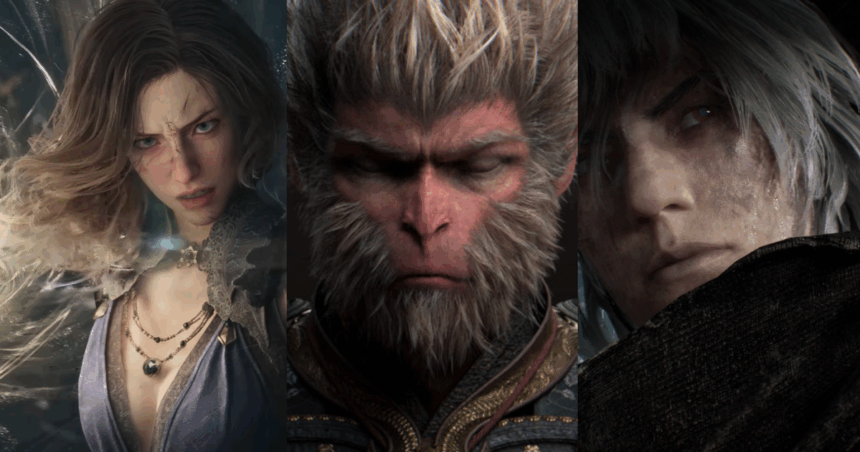Labeling Black Myth: Wukong simply as a success doesn’t do it justice. In just three days, this action-RPG became a massive hit, pushing 10 million copies and earning a spot as the second most-played game on Steam. Now, as its sales have soared past the monumental 30 million mark, it stands in competition with heavyweights like Elden Ring, just shy of the mark set by Hogwarts Legacy. The acclaim surrounding it has been overwhelming, with multiple award nominations and winners. It’s worth noting that its physical release has breathed new life into businesses everywhere, although it’s surprisingly not available on Xbox platforms.
Game Science’s ambitious title marks a significant moment in the Chinese gaming industry, captivating audiences across the globe. As reported by Nikkei Asia, the restrictions on console production in China lingered until 2015. That pivotal shift saw mobile gaming’s dominance fade, paving the way for the rise of PC and console games, bolstered by heavy investments from titans like Tencent and Sony’s China Hero Project. Black Myth: Wukong stands as the first AAA title from China, setting a noteworthy precedent.
Wu Li, who heads the Beijing-based publisher CE-Asia, draws a parallel between the success of the gaming sector and China’s broader economic growth. “From 2003 to 2024, revenue in gaming jumped from around 10 billion yuan to a staggering 390 billion yuan, with 674 million gamers now in China,” he comments. “This indicates that China is solidifying its position as a key player in the global gaming arena.” He adds, “A potent talent pool is emerging, with a sophisticated ecosystem taking shape in the industry.”
The success of Wukong has inspired an impressive wave of action-RPG titles from Chinese developers, including Phantom Blade Zero, Tides of Annihilation, Lost Soul Aside, Wuchang: Fallen Feathers, and AI Limit. Interestingly, most of these projects were underway before Wukong’s phenomenal reception. For example, Ultizero Games’ Lost Soul Aside originated as a fan project influenced by the likes of Final Fantasy 15 and Devil May Cry, initiated over 15 years ago and now on the cusp of release.
In light of Wukong’s achievements, have the ambitions of Chinese developers evolved? Moreover, what is it about the action-RPG genre that seems to resonate so strongly with them?
To delve deeper into this changing landscape, I spoke with developers from three of the upcoming titles. All acknowledged the heightened expectations resulting from Wukong’s triumph, as well as the burgeoning confidence it has instilled in them.
“Our expectations haven’t fundamentally changed, but the global perception of Chinese games has certainly shifted,” noted Liang, the director of Phantom Blade Zero. “While we have more resources at our disposal now, we also feel the weight of increased pressure post-Wukong.” S-Game has generated buzz for Phantom Blade Zero, especially after its promotion at the 2023 PlayStation State of Play. What started as a project that felt “a bit larger than an indie game” now enjoys significant global interest, ranking second in trailer viewership behind Insomniac’s Spider-Man 2. Consequently, the studio has ramped up production efforts.
Having fostered a friendship with Game Science’s CEO Feng Ji for a decade and both entities sharing Tencent as an investor, Liang stated, “Now it’s evident that a Chinese game can reach 30 million sales within six months. The bar has been raised.” He continued, “Although we feel that pressure, our focus remains on delivering a compelling gameplay experience. Thankfully, increased funding and resources will allow us to refine our title.” This aid includes investments from the Chinese government aimed at employing 3D scans of historical sites to enrich the game’s experience, a feature Liang strongly believes will enhance immersion.
Ary Chen, Co-CEO & COO of Eclipse Glow Games, creators of Tides of Annihilation, asserts that their skilled team would have flourished regardless of Wukong’s accolades. Yet, witnessing that success has undoubtedly propelled their project with newfound assurance. “Our core team comes with extensive experience from titles like Yakuza 0, For Honor, and Assassin’s Creed,” he shares. “We’re channeling that expertise into Tides of Annihilation to elevate its overall quality.”
Though Chen acknowledges the recent victories of Chinese games in the PC and console arenas are “immensely inspiring,” he maintains that their mission remains steadfast. “This game has been in the works for nearly three years—long before Wukong’s rise—so our goals haven’t shifted. Nonetheless, their triumph has affirmed our direction. We see exciting opportunities for global players to experience the creativity and narrative depth of Chinese developers. This means everything to us,” he explained.
“Everyone now realizes there is the potential for a Chinese-made game that can make 30 million copies in six months.”
Li, who leads CE-Asia and publishes AI Limit, described Black Myth: Wukong as a “seminal moment for the Chinese gaming landscape.” He emphasized how it has “validated the belief that premium Chinese games can capture substantial market share both at home and abroad.” His team had already participated in PlayStation’s China Hero Project back in 2019, long before Wukong debuted. However, in the post-Wukong world, developers and publishers alike feel the increased scrutiny of rising expectations from fans along with added pressure in marketing and development.
China’s gaming ecosystem is evolving noticeably, with a growing emphasis on PC and console development over mobile gaming. This transition paves the way for bigger budgets, breathtaking graphics, and more immersive gameplay.
Liang likens this transformation to what he views as the “golden age of PlayStation 1 and 2” during the 1990s, a time when “remarkable games emerged even from smaller development teams with limited funding.” He elaborates, “The appeal of console gaming stems from its superior performance compared to mobile gaming—offering vivid visuals, intricate controls, and rich storytelling. These dynamic features find their finest expression within action-RPGs.”
Li acknowledges action-RPGs as a “majestic, traditional genre,” cherished by many developers since their youth. This resurgence is largely influenced by free-to-play action-RPGs like Genshin Impact, which have effectively bridged multiple platforms.
“Thanks to these strides, the appetite for action-RPGs has surged,” Li notes. “This indicates a bright future for the genre. For developers, creating an action-RPG is both feasible and gratifying, aided by robust engine support and established frameworks. This suits emerging teams striving to manage their budgets sensibly.”
At Eclipse Glow Games, excitement permeates their vision for Tides of Annihilation: “We focus more on action-adventure elements, highlighting fast-paced, intense combat that veers away from traditional Soulslike concepts.” This has inspired innovations such as summoning spectral knights during battles and incorporating environmental puzzles that enhance gameplay.
These developers are eager to reimagine familiar action-RPG mechanics by adding their unique takes. While many of these titles are still in development, early glimpses reveal a rich variety in approaches. Notably, Wukong received some critiques for repetitive combat, despite its remarkable boss encounters. In contrast, Phantom Blade Zero fuses the dynamic combo mechanics of Devil May Cry with an intricate exploration style reminiscent of Dark Souls, set against an atmospheric backdrop akin to Resident Evil. Early gameplay promises an impressive parry-based combat system. Wuchang: Fallen Feathers, produced by Leenzee, offers stunning visuals but has been likened to FromSoftware’s stylistic tendencies.
AI Limit ventures into the Soulslike realm with a creative twist—a Sync Rate system that increases players’ attack power as they build energy during combat. Li shared, “We have contemplated how players can adjust to face challenges and leverage various strategies to overcome them.” The game thrives on offering an engaging journey that empowers players to learn, evolve, and ultimately master their experiences as they tackle adversities from unique angles. Its distinctive cel-shaded anime visual style further enhances its appeal amidst a crowded genre.
With a slew of titles emerging in the action-RPG space, one wonders if a spirit of friendly competition exists among studios, particularly given many share common investors.
“Absolutely!” Liang confirmed, contrasting it sharply with the cutthroat nature of mobile game development, which often revolves around a few live-service games. “In the realm of single-player experiences, competition is markedly lighter. Regardless of a game’s quality, players usually shift to new experiences after a month. Hence, if Black Myth: Wukong thrives, it creates new avenues for all developers, as players will inevitably seek out more experiences from Chinese content creators.”
Liang captures the essence of Phantom Blade Zero as embodying “kung-fu punk,” intertwining traditional Chinese lore with contemporary, globally-influenced aesthetics, blending steampunk and cyberpunk with Wuxia fantasy. “Visualize it as a dark fantasy sibling to John Wick,” he explains.
“A central element of our mission is to dismantle cultural barriers,” Liang states emphatically. “We aim to ensure that players from various backgrounds can engage with our game without the encumbrance of cultural misconceptions.” This commitment has led to the promotion of universal themes—such as loyalty, vengeance, and love—that resonate across cultures.
However, do Chinese developers tread carefully as they aim for an international audience? The incredible achievement of Black Myth: Wukong has clearly demonstrated that a Chinese-developed game can attain worldwide acclaim, even steeped in rich Chinese storytelling. Its roots in the classic novel Journey to the West signify a genuine appetite for Chinese narratives beyond its borders. But how will this influence future games? Should they target a global audience or commit unwaveringly to authentically Chinese themes?
It seems Tides of Annihilation leans towards the former, weaving the narrative of King Arthur and his knights into a contemporary London backdrop. Trailers reveal distinctly British motifs—recognizable road signs, bus stops, and iconic red telephone boxes.
“We strive to eliminate any barriers that could hinder international players from grasping our game.”
Integrating the King Arthur legend fit seamlessly into their action-adventure game vision, Chen highlights, noting their admiration for British culture and recognition of London as a bustling global metropolis. They undertook research trips to gather player feedback and absorb insights from historical landmarks. Meanwhile, the intricate character designs and fluid animations signal a captivating fusion of Eastern and Western aesthetics, aspiring for broad appeal.
On the other hand, Liang emphasizes maintaining a distinctly Chinese essence in Phantom Blade Zero, asserting that authenticity remains pivotal while making the game accessible to a global audience. “Consider renowned creators like Hidetaka Miyazaki or Hideo Kojima; their games may delve into sci-fi or Western fantasy, yet they inherently reflect Japanese cultural elements,” he observes. “Our goal is to lower the entry barrier for players, allowing them to connect with our narratives without extensive cultural education. Yet, being Chinese, we infuse our unique perspectives and philosophies into our games.”
For Liang, authenticity is non-negotiable. He contrasts with Sloclap, a French studio that produced Sifu, exploring a kung-fu narrative grounded in Chinese culture, and questions, “If they can achieve that, why can’t we craft something even more authentic from within our culture?”
Liang emphasizes that effective communication and transparency play a key role in producing a title capable of resonating globally. Learning from experiences in the U.S. and Europe enables his team to engage in open dialogue in English with the gaming community, nurturing an understanding of cultural subtleties. “I’m not certain how many other studio heads in China share similar journeys,” he reflects. But the need for transparent communication was made clear during their involvement in live-service games, which underscored the importance of community engagement.
Li takes a balanced view, asserting that while players hail from varied backgrounds, they are united by a shared love for outstanding gaming experiences. “I truly believe that borders fade away in the gaming realm,” he asserts. “What matters is the passion that radiates from the development team.” He sums up this sentiment by saying, “Creators focus on crafting from their expertise, passion, and integrity. I trust that global audiences will appreciate and rally behind the genuine enthusiasm that fuels a game.”






















